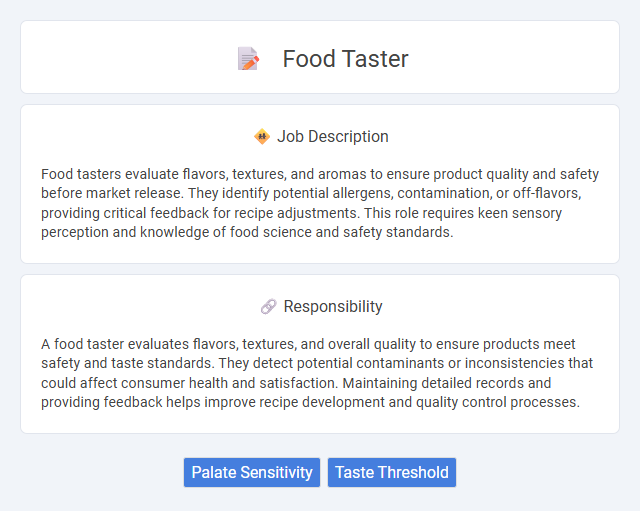
Food tasters evaluate flavors, textures, and aromas to ensure product quality and safety before market release. They identify potential allergens, contamination, or off-flavors, providing critical feedback for recipe adjustments. This role requires keen sensory perception and knowledge of food science and safety standards.
Individuals with a keen sense of taste and smell are likely suitable for a food taster job, as these skills are essential in accurately identifying flavors and detecting inconsistencies. People who are sensitive to allergies or have dietary restrictions might not be appropriate candidates due to potential health risks. A high tolerance for repetitive tasting and a strong ability to focus under monotony probably increase suitability for this role.
Qualification
A food taster must possess a refined palate and extensive knowledge of flavors, textures, and culinary techniques to accurately evaluate food quality and safety. Strong sensory perception, attention to detail, and experience in food science or culinary arts are highly valued qualifications. Formal training or certifications in food safety, nutrition, or sensory analysis enhance credibility and effectiveness in this specialized role.
Responsibility
A food taster evaluates flavors, textures, and overall quality to ensure products meet safety and taste standards. They detect potential contaminants or inconsistencies that could affect consumer health and satisfaction. Maintaining detailed records and providing feedback helps improve recipe development and quality control processes.
Benefit
A food taster job likely offers the benefit of experiencing a wide variety of flavors and cuisines, which can enhance culinary knowledge and palate sensitivity. There is probable exposure to new and exclusive food products before the market release, allowing for firsthand influence on food quality and safety. This role may also provide unique professional opportunities within the food industry, including potential connections with chefs and food scientists.
Challenge
The food taster job likely involves facing the challenge of detecting subtle flavors and spotting potential safety issues that others might miss. It probably demands a highly trained palate and strong sensory sensitivity to accurately evaluate a wide range of foods. The role may also require resilience to repeatedly sample unfamiliar or unappealing items while maintaining objectivity and consistency.
Career Advancement
Food tasters develop acute sensory evaluation skills critical for progressing into quality assurance or product development roles within the food industry. Expertise in identifying subtle flavor profiles and potential contaminants enhances opportunities to advance to managerial positions overseeing safety and compliance protocols. Consistent performance and specialized training in food science propel career growth toward research and innovation leadership.
Key Terms
Palate Sensitivity
Food tasters require exceptional palate sensitivity to accurately identify subtle flavors, textures, and aromas in various food products. This refined sensory ability helps detect quality inconsistencies, contamination, and flavor balance, ensuring product safety and consumer satisfaction. Enhanced palate sensitivity develops through rigorous training and experience, enabling precise flavor profiling and formulation adjustments.
Taste Threshold
Food tasters possess a finely tuned taste threshold that enables them to detect subtle flavors and off-notes in food products. This sensitivity is crucial for quality control, ensuring consistency and safety in the final product. Their ability to identify minute differences in taste helps manufacturers maintain high standards and meet consumer expectations.
 kuljobs.com
kuljobs.com